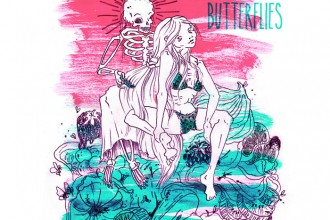We’ve all done it, haven’t we? Judging the guy that takes a disabled parking spot and strolls, crutch- and limp-free, into the store. You want evidence of their disabilities; you want to challenge them—but of course you don’t. You just exchange meaningful looks with other righteous passers-by.
This is the bane of the able-bodied passing. Not much is understood about chronic illnesses that show little in the way of outward symptoms. Doctors don’t know how to treat them, and the general public barely knows what they entail. That is why Christine Miserandino, sufferer of lupus and creator of But You Don’t Look Sick, has garnered such popularity with Spoon Theory, a novel way of describing and understanding chronic illness.
Fibromyalgia is a condition causing chronic widespread pain of varying intensity. Myalgic encephalomyelitis (ME), also known as chronic fatigue syndrome (CFS), is another such invisible illness. Try living with both: Sensa Nostra speaks to Jessica Hubbard, 21, about Spoon Theory and why you’ll never be invited to a CFS rave.
I’ve had myalgic encephalomyelitis for about a year and eight months now. It’s bit of a mouthful. Basically you know you’re a spoonie if you can spell that. I think I probably got fibromyalgia around the time of emigrating from England to Berlin for university exchange last autumn. There’s a lot of comorbidity with these things, so you often get two at the same time. I was kind of hoping that I had lupus…there’s a medicine they can give you for that, but with ME you’ve just got to rest, that’s the cure. Just rest. And because I was very bad at accepting that I had it in the first place, I made it worse.
Lots of people don’t even know what fibromyalgia is, and I wouldn’t expect anyone to know. There isn’t enough information about it. One in twenty people has a chronic illness, and for women the rate is even higher. My sister actually got ME when she was eleven. There are various theories about how it’s caused, with trauma and post-viral things being the most common.
The fact that I can pass as able-bodied has its ups and downs. People look at me and they assume that I’m healthy, and that in some ways is a real gift. On the other hand, once I went to a cafe and was told I couldn’t use the disabled toilet because it was for disabled people. The barista just made that assumption by looking at me and probably thinking, “You can walk, you’re not in a wheelchair, you don’t have crutches.” I do have a stick, but I’ve been really put off from using it because I’ve had a couple of nasty incidents with people being jerks.
You feel like a fraud. For a start, it’s really hard to get diagnosed—you have to kind of fight for a diagnosis. You’re living with something that you not only worry other people think you’re making up, you’re actually asking yourself, “Am I going mad? What is this pain? Why am I so tired? Am I just being a huge baby?” It’s difficult because there are no physical symptoms other than the way you feel.
The most exhausting thing for me is just standing up for a long time. When you sit on the train and someone needs a seat, you feel like you should stand up and offer yours. And sometimes I do because I can’t bear to just sit there. People might make remarks, but ultimately it’s you who criticizes your right to sit down and look after yourself; your right to self-care.
You lose independence when you have these illnesses. I love being busy. I multitask at everything, to my own downfall. It got to the point in Berlin where I couldn’t even go to class anymore. We lived on the top floor of our building, so I was only allowed to leave the apartment once or twice a week. That’s crap when you’re a twenty-one year old woman who wants to be doing stuff, just because the stairs were too exhausting.
I first heard about Spoon Theory through the Tumblr community. There’s not an awful lot of getting out of the house, and quite a lot of the time spoonies have to give up their work, so the Internet is a great resource to connect with other people who have chronic illnesses. Obviously there’s not much in the way of CFS parties; everyone’s exhausted all the time.
The title of Christine Miserandino’s website, ‘But You Don’t Look Sick’, kind of encapsulates a lot of the struggles that spoonies have: being in pain a lot of the time, being very tired, and also being a bit invisible. The difference between being a spoonie and being healthy is this privilege that healthy people have that they don’t realize they have: not having to make choices about simple things that you want to do in everyday life.
The spoon theory works off of the basis that if you’re a healthy person, you have unlimited spoons and you don’t think about spending them. Each spoon counts for a bit of energy: for example having a shower would be one spoon; if you’re washing your hair then it might be two. Simple tasks soon add up to a lot of spoons, and when you’re a spoonie you have a limited number. Some might have twenty, and people more severe chronic illnesses might have five. If you want to put some laundry on, then you might only have two or three spoons left for the rest of the day, and you’re thinking, “Oh god, I also wanted to cook risotto or see a friend.” You have to think carefully about the ways in which you spend those spoons.
You can also do a thing called borrowing spoons from the next day. This is something that really rang true for me. It’s a perfect way of describing how ME in particular can affect you in the long run, and how doing energetic activities can really come back and bite you in the bum. I went shopping on Monday, and I hardly ever get to go shopping anymore. It used more than my usual quota of spoons for the day, so I borrowed spoons. But you know that the next day you’re going to have even less spoons than usual, and if you can’t manage off of those spoons you borrow more from the next day… So it gets more difficult in terms of sustaining a ‘normal’ life.
I think it is hard for non-spoonies to grasp quite how different your life is once you have a chronic illness, and I think the spoon theory really is a great shorthand to encapsulate what it’s all about. Once you’ve explained it to people in those terms, if you’ve got to cancel plans with a friend, you can say, “Sorry, I don’t have enough spoons today,” and that’s all they need to know. They get it.
It’s about those choices—that privilege that you don’t realize you have.
I think most young people take their health for granted. Something like going to a festival would be completely off my list. I have always wanted to go to Glastonbury. My aunt runs the teepee field there; one of my mums went to the first ever Glastonbury and she’s been a heap of times since, so I’ve heard their stories. My sister is going this year and I’m so sad that I can’t be there. My fiancé and I were trying to get tickets, and in the end we realized, “This is such a stupid idea, a festival is like the worst thing you could do.” How many spoons even is that? You’d have to hibernate and hoard all your spoons. That’s not realistic.
There are clinical trials going on at the moment for fibromyalgia. You have to bathe for twenty minutes a day in warm water, ideally in a pool, but I don’t have the energy to go to the gym every day and sit in the hot tub. That’s too many spoons. If I do that, then I can’t make lunch, or I can’t walk up and down the stairs a few times.
I think most doctors really just don’t know enough about these chronic illnesses, and are often really reluctant to refer you to a specialist. I still haven’t seen a specialist and it’s been nearly two years. You can’t begin to get the treatment until you’ve been referred, and to get a diagnosis is almost impossible. Even my diagnosis is provisional, they’re still ‘ruling things out’, so I have blood tests all the time, I’ve had an MRI and a heart monitor too.
There was a big meta-analysis recently of all the studies looking at people with chronic illnesses. It found that the complete recovery rate was 2%, and most people have the illness for the rest of their lives. That was quite a big deal for me, realizing that actually this is something that I now have to live with forever, and there’s a good chance that I will never feel normal again, that I will never have no pain, that I’ll never be able to just do another Interrailing trip, that I’ll never be able to go to Glastonbury. My sister actually made a really good recovery: she still has it, she still has to manage it, but she goes to university in Holland now, and is even going to Peru over the summer. It does give me hope. Maybe I’ve got good genes.
My top priority is to be able to go back to university in October. It’s helpful to have that. It gives me the patience and motivation to just say, “No, I won’t see this friend today, because it’ll mean that I can finish my degree, it’ll mean that I can graduate.” I find it’s also helpful to have smaller targets. You have to be really strict with yourself; I’m pretty bad at that but I am getting better. Joe, my fiancé, is really supportive. I think it’s important to have at least one person who understands and sees all your symptoms firsthand.
What Spoon Theory has mostly brought to me is an awareness of the privilege I had before. It’s made me value health so much, which is not something you’d expect at my age. If Spoon Theory were a kind of standardized way of talking about chronic illness, it would be so helpful for able-bodied people, apart from anything else. Awareness is important—even if we don’t look sick.







